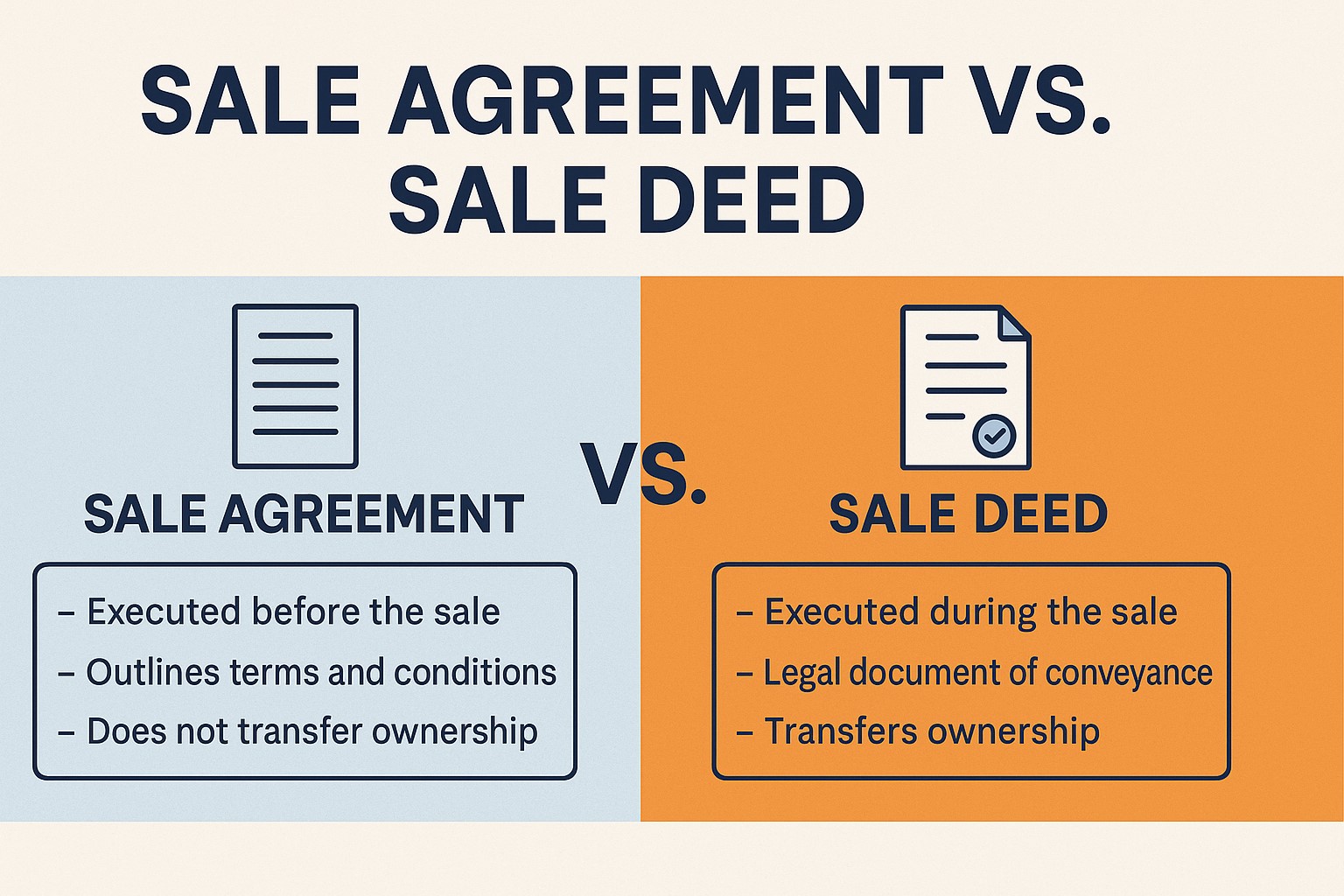Buying or selling property is one of the most significant financial decisions in life. Whether you’re a first-time buyer or an experienced investor, understanding the legal documents involved is crucial. Two of the most important documents in a property transaction are the Sale Agreement and the Sale Deed. While they may sound similar, they serve very different purposes and have distinct legal implications.
In this blog post, we’ll break down the key differences between a Sale Agreement and a Sale Deed—and what they mean legally.
📄 What is a Sale Agreement?
A Sale Agreement is a legal contract between a buyer and a seller that outlines the terms and conditions of a future property transaction.
🔑 Key Features:
- Promise to Sell and Buy: It is a commitment that a sale will take place in the future under agreed terms.
- Conditions Listed: Includes property details, sale price, payment schedule, possession date, etc.
- Not a Transfer of Ownership: It does not transfer ownership—only expresses intent.
🧾 Legal Status:
- Governed by the Indian Contract Act, 1872.
- Can be enforced in a court of law if either party fails to comply.
- It is not a mandatory document for registration, but registering it strengthens legal standing.
🧾 What is a Sale Deed?
A Sale Deed is the final and legally binding document that transfers ownership of the property from the seller to the buyer.
🔑 Key Features:
- Executed After the Sale Agreement: It formalizes the sale after all conditions in the agreement are met.
- Transfer of Title: This document legally transfers ownership to the buyer.
- Must Be Registered: Under the Registration Act, 1908, registration is mandatory.
🧾 Legal Status:
- Provides legal proof of ownership.
- Without a registered Sale Deed, the buyer has no legal claim over the property.
- Used for mutation, applying for loans, and paying property tax.
⚖️ Major Differences at a Glance:
| Feature | Sale Agreement | Sale Deed |
|---|---|---|
| Purpose | Sets terms for future sale | Finalizes and executes the sale |
| Legal Nature | Executory (promise to do something) | Executed (actual transfer of rights) |
| Transfer of Ownership | No | Yes |
| Registration | Optional but advisable | Mandatory |
| Legal Protection | Can be enforced for breach of contract | Acts as legal proof of ownership |
| Governed By | Indian Contract Act, 1872 | Registration Act, 1908 & Transfer of Property Act, 1882 |
⚠️ Legal Implications You Should Know
- Without a Sale Agreement: You risk disputes due to unclear terms. Always document agreed conditions before making payments.
- Without a Registered Sale Deed: The buyer has no legal ownership, even if the payment is complete. Registration is non-negotiable.
- For Home Loans: Banks will not approve a loan based on a Sale Agreement alone—they require the Sale Deed for collateral.
- In Case of Disputes: Courts rely on the registered Sale Deed as the final authority for ownership.
✅ Best Practices for Buyers and Sellers
- Always sign a Sale Agreement before paying any advance.
- Ensure that all terms—like possession date, title status, and liabilities—are clearly mentioned.
- Execute and register the Sale Deed as soon as the transaction is completed.
- Use the help of a legal expert or property lawyer to draft and verify documents.
🏁 Conclusion
Understanding the difference between a Sale Agreement and a Sale Deed is crucial for protecting your interests in any property transaction. While the Sale Agreement sets the stage, the Sale Deed is the grand finale that seals the deal and secures your ownership. Never skip proper documentation—it’s your best defense in the world of real estate.




